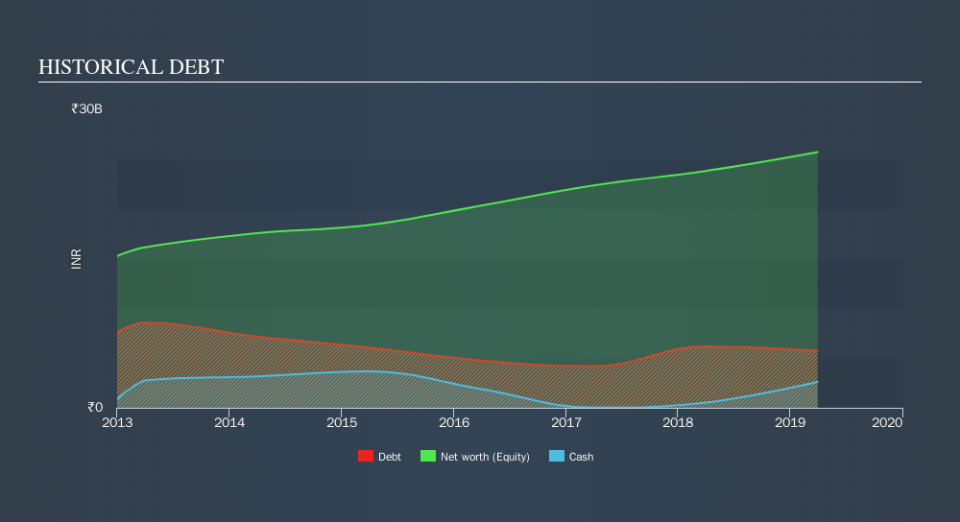Does Gujarat Industries Power (NSE:GIPCL) Have A Healthy Balance Sheet?

The external fund manager backed by Berkshire Hathaway's Charlie Munger, Li Lu, makes no bones about it when he says 'The biggest investment risk is not the volatility of prices, but whether you will suffer a permanent loss of capital. It's only natural to consider a company's balance sheet when you examine how risky it is, since debt is often involved when a business collapses. Importantly, Gujarat Industries Power Company Limited (NSE:GIPCL) does carry debt. But should shareholders be worried about its use of debt?
When Is Debt Dangerous?
Debt is a tool to help businesses grow, but if a business is incapable of paying off its lenders, then it exists at their mercy. Part and parcel of capitalism is the process of 'creative destruction' where failed businesses are mercilessly liquidated by their bankers. However, a more frequent (but still costly) occurrence is where a company must issue shares at bargain-basement prices, permanently diluting shareholders, just to shore up its balance sheet. Of course, debt can be an important tool in businesses, particularly capital heavy businesses. When we think about a company's use of debt, we first look at cash and debt together.
See our latest analysis for Gujarat Industries Power
What Is Gujarat Industries Power's Net Debt?
The image below, which you can click on for greater detail, shows that Gujarat Industries Power had debt of ₹5.73b at the end of March 2019, a reduction from ₹6.17b over a year. However, it does have ₹2.61b in cash offsetting this, leading to net debt of about ₹3.12b.
How Healthy Is Gujarat Industries Power's Balance Sheet?
According to the last reported balance sheet, Gujarat Industries Power had liabilities of ₹4.38b due within 12 months, and liabilities of ₹8.23b due beyond 12 months. On the other hand, it had cash of ₹2.61b and ₹2.28b worth of receivables due within a year. So its liabilities total ₹7.72b more than the combination of its cash and short-term receivables.
This is a mountain of leverage relative to its market capitalization of ₹10.3b. This suggests shareholders would heavily diluted if the company needed to shore up its balance sheet in a hurry.
We measure a company's debt load relative to its earnings power by looking at its net debt divided by its earnings before interest, tax, depreciation, and amortization (EBITDA) and by calculating how easily its earnings before interest and tax (EBIT) cover its interest expense (interest cover). Thus we consider debt relative to earnings both with and without depreciation and amortization expenses.
Gujarat Industries Power has a low net debt to EBITDA ratio of only 0.56. And its EBIT easily covers its interest expense, being 11.1 times the size. So we're pretty relaxed about its super-conservative use of debt. Also good is that Gujarat Industries Power grew its EBIT at 17% over the last year, further increasing its ability to manage debt. When analysing debt levels, the balance sheet is the obvious place to start. But ultimately the future profitability of the business will decide if Gujarat Industries Power can strengthen its balance sheet over time. So if you want to see what the professionals think, you might find this free report on analyst profit forecasts to be interesting.
But our final consideration is also important, because a company cannot pay debt with paper profits; it needs cold hard cash. So the logical step is to look at the proportion of that EBIT that is matched by actual free cash flow. In the last three years, Gujarat Industries Power's free cash flow amounted to 24% of its EBIT, less than we'd expect. That weak cash conversion makes it more difficult to handle indebtedness.
Our View
Gujarat Industries Power's interest cover was a real positive on this analysis, as was its net debt to EBITDA. On the other hand, its level of total liabilities makes us a little less comfortable about its debt. Looking at all this data makes us feel a little cautious about Gujarat Industries Power's debt levels. While we appreciate debt can enhance returns on equity, we'd suggest that shareholders keep close watch on its debt levels, lest they increase. Another positive for shareholders is that it pays dividends. So if you like receiving those dividend payments, check Gujarat Industries Power's dividend history, without delay!
Of course, if you're the type of investor who prefers buying stocks without the burden of debt, then don't hesitate to discover our exclusive list of net cash growth stocks, today.
We aim to bring you long-term focused research analysis driven by fundamental data. Note that our analysis may not factor in the latest price-sensitive company announcements or qualitative material.
If you spot an error that warrants correction, please contact the editor at editorial-team@simplywallst.com. This article by Simply Wall St is general in nature. It does not constitute a recommendation to buy or sell any stock, and does not take account of your objectives, or your financial situation. Simply Wall St has no position in the stocks mentioned. Thank you for reading.

